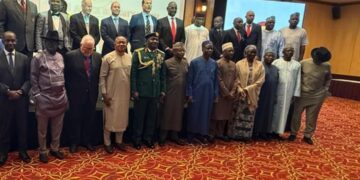In a decisive operational shift, the Nigerian Air Force (NAF) has summoned all Air Component Commanders from across the country to Headquarters, Abuja, under the instruction of Air Marshal Sunday Kelvin Aneke, Chief of the Air Staff (CAS). The meeting comes at a time of mounting geopolitical scrutiny, including claims from Washington alleging “over 7,000 Christians killed in 2025” in Nigeria — accusations that Abuja contests as misleading and unhelpful to national security operations.
Flight Plan: From Morale to Mission Acceleration
According to official NAF statements, Air Marshal Aneke directed theatre commanders to recalibrate operations with three core priorities:
-
Fly smarter, strike harder: Precision air strikes led by intelligence-driven targeting.
-
Synchronise air, land and maritime assets: Encouraging joint-service cohesion across the multiple theatres of insurgency.
-
Protect civilians while rooting out threats: The CAS emphasised mission discipline, professionalism and purpose: “Every mission must reflect professionalism, purpose, and patriotism.”
Why Timing Matters
This operational surge comes during a politically charged backdrop. U.S. commentary on Nigeria has amplified, with calls for accountability tied to alleged large-scale targeting of Christians. For Abuja, the timing of the CAS’s summons is significant:
-
It sends a clear internal message that military posture is escalating, and capability is sharpening.
-
It addresses external perceptions head-on, signalling that Nigeria retains command of its security agenda.
-
It positions the NAF to visibly support the government’s counter-terror agenda under Bola Ahmed Tinubu, whose administration reports thousands of terrorists neutralised and abductees rescued (since May 2023).
Narrative vs. Reality – A Tactical and Political Intersection
The U.S. claims of thousands of Christian casualties in 2025 have become part of the wider international narrative on Nigeria’s security crisis. Abuja counters that:
-
Terror violence in Nigeria is not the exclusive domain of any single religion or ethnic group.
-
Simplistic casualty figures risk distorting the conflict landscape and emboldening interventionist impulses.
-
Operational transparency and effective targeting are more constructive than unverified numbers.
Against such a backdrop, the CAS’s mandate for “smarter, harder” strikes is a calibrated response: controlling the tactical battlefield while contending with the strategic narrative war.
Operational Implications for National Defence
-
The NAF will likely increase sortie rates, widen ISR (Intelligence, Surveillance and Reconnaissance) coverage and deploy more precision-guided assets in insurgency zones.
-
Joint operations with the Army, Navy and paramilitary agencies will intensify — integrated targeting, shared intelligence and unified theatre command will become the norm.
-
Enhanced visible operational tempo helps Nigeria assert sovereignty and capability — especially crucial when external actors cast doubt on national security readiness.
Strategic Outlook
The message from Abuja is clear: Nigeria will fight terrorism on its terms. External commentary, including allegations of targeted Christian killings, may prompt diplomatic scrutiny — but the military’s focus is internal, strategic and capabilities-driven.
This recalibration of the Air Force reflects more than operational urgency — it signals that Nigeria rejects the narrative of collapse, and asserts itself once again as a security provider, not just a security recipient.
The skies over Nigeria may soon grow busier.
But they will be patrolled by Nigerians in control, with disciplined skill, intelligence-led planning and unwavering commitment to national unity.







